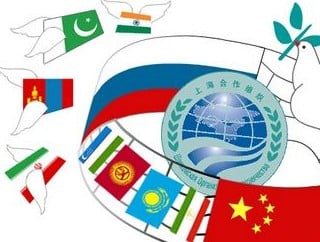The SCO Summit in Bishek, to Address US Threats, Geopolitics of the Region, Cooperation

Shanghai Cooperation Organization (SCO) 19th summit is scheduled to be held in Bishkek, Kyrgyzstan, on 13-14 June 2019. It is a Eurasian political, economic, and security alliance, the creation of which was announced on 15 June 2001 in Shanghai, China by the leaders of China, Kazakhstan, Kyrgyzstan, Russia, Tajikistan, and Uzbekistan; but its Charter, formally establishing the organization, was signed in June 2002 and entered into force on 19 September 2003. The original five nations, with the exclusion of Uzbekistan, were previously members of the Shanghai Five group, founded on 26 April 1996. Since then, the organization has expanded its membership to eight countries when India and Pakistan joined SCO as full members on 9 June 2017 at a summit in Astana, Kazakhstan. There are 4 observer states Afghanistan, Belarus, Iran, and Mongolia. While 6 countries are dialogue partners: Armenia, Azerbaijan, Cambodia, Nepal, Sri Lanka, and Turkey. It is well understood that the organization may expand in the future extending full membership to other countries too.
The Heads of State Council (HSC) is the supreme decision-making body in the SCO, it meets once a year and adopts decisions and guidelines on all important matters of the organization. This summit will be 19th in its series and will be held in Bishkek, Kyrgyzstan on 13-14 June 2019.
All heads of states (Presidents/ Prime ministers) are expected to attend the subject summit. Pakistan Prime Minister Imran Khan will be attending this year’s summit. All preparations are in place for his trip. He is also scheduled to meet President Putin and President Xi on sideline meetings and expected to discuss broad spectrum on all issues by lateral basis especially the dynamic geopolitics of the region and mutual cooperation in all dimensions. He might grab the chance to meet Prime Minister Modi too.
In fact, Pakistan plays a pivotal role in Eurasia and serves as gateway to the Arabian Ocean – Hot Waters. It is an all-weather, shortest, and most economical trade route. It might change the trade pattern for the whole world. Pakistan’s deep-sea Gwadar seaport will be the hub of all future commercial activities.
Pakistan enjoys historical, cultural and religious links with most of the central Asian states. China is time tested reliable friend, Russia is also a country of shared destiny. Russia and Pakistan are suffering western coercion and sanctions.
SCO is a platform to discuss all relevant issues and promote cooperation and harmony. With the emerging geopolitics of the region, SCO compels all of the member states to formulate a joint strategy to counter the growing trend of coercion, threats, use of force and military build-ups. US-Iran Tension, Sino-US tension, Afghan Issues, Indo-Pacific Alliance and anti-BRI sentiments, all will be top of agenda and may be discussed in depth.
While all heads of states meet, it is expected to come up with the solutions to maintain the stability of the region, peace, and development. This region inhabits almost half of the world’s population. Stability of this region means the stability of the whole world.
This region is rich in natural and human resources. There exists a huge potential for this region to overcome poverty and gain prosperity. There is a dire need to promote cooperation, mutual understanding, harmony, and stability.
The expectations are high and it is time to take extraordinary measures to overcome the existential challenges in this region. Trust, “if there is a will, there is a way”.
*
Note to readers: please click the share buttons above or below. Forward this article to your email lists. Crosspost on your blog site, internet forums. etc.
Prof. Engr. Zamir Ahmed Awan, Sinologist (ex-Diplomate), Non-Resident Fellow of CCG (Center for China and Globalization), National University of Sciences and Technology (NUST), Islamabad, Pakistan.

